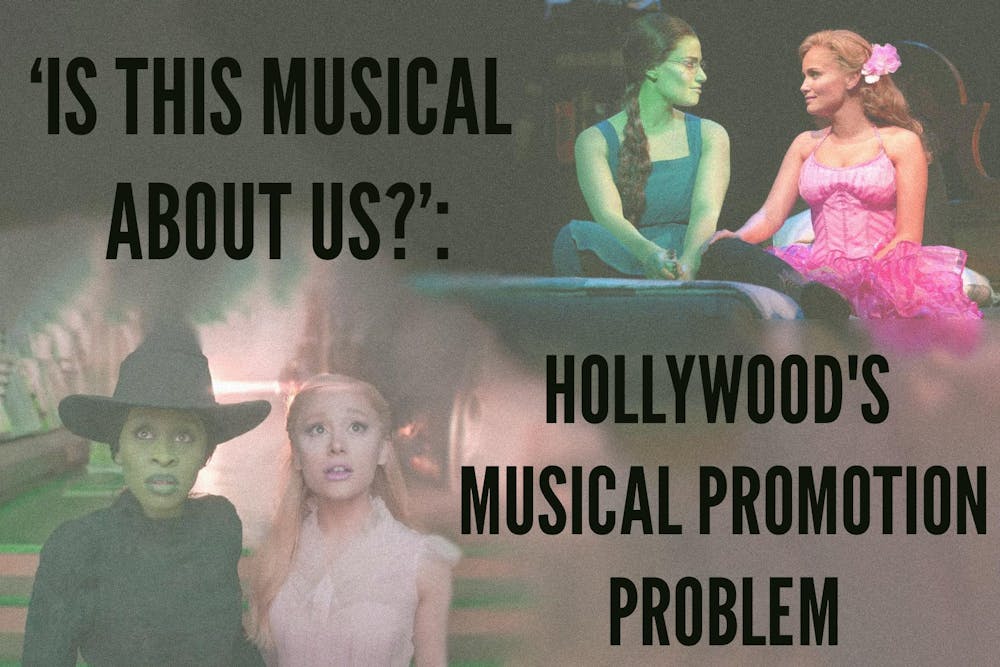Hollywood has a long history with movie musicals. Films such as “The Wizard of Oz,” “The Sound of Music,” “All That Jazz” and “Singing in the Rain” are still considered classic films to this day, not only as musicals but as representations of the American film industry. Broadway musicals have been adapted for the stage as long as there has been a film industry. At the second Academy Awards ceremony ever in 1929, a film called “The Broadway Melody,” adapted from popular Broadway shows at the time, won Best Picture. In fact, many Best Picture winners have been musicals. Most recently, 2002’s “Chicago” was the last musical to win Best Picture at the Academy Awards, with others such as “Les Misérables,” “La La Land” and Spielberg’s remake of “West Side Story” having been nominated for the same award since.
Every year, adaptations of Broadway musicals get released into theaters. Within the last month, Paramount released a musical version of “Mean Girls,” and the month before that Warner Bros. came out with a musical “The Color Purple,” both pulled from the stage. If you hadn’t seen these films, though, you might not have noticed they were musicals. That’s the problem: Hollywood doesn't want to advertise musical films as musicals.
Where does Hollywood’s problem with musicals come from?
To understand the “why” of the issue, we have to look at the recent history of movie musicals, specifically how they are promoted. The aforementioned “West Side Story” remake releases a trailer, with lead actress Rachel Zegler singing the song “Tonight” throughout. That same year, Ben Platt stars in “Dear Evan Hansen,” in the same titular role he originated in New York. Similarly, he sings throughout the trailer. Lastly, rounding out my examples from 2021, Lin-Manuel Miranda’s pre-Hamilton musical “In the Heights” hits theaters. Out of the three films, this is the film most open about being a musical in its promotion. But, all three are open about being musical films. So what changed?
In December of 2019, one movie released that I genuinely believe changed how general audiences will feel about musical films forever. One of the most popular, well-known Broadway musicals of all time received a film adaptation. Tom Hooper’s “Cats” is one of the most bizarre films I have ever seen, a conclusion shared by many. The film’s reception was not positive, and general audiences latched onto it for its sheer absurdity and bad digital effects. Ultimately, “Cats” became a laughing stock.
“Cats” didn’t turn studios off from producing musical films entirely. As mentioned above, there were three released in 2021. However, films as products are measured ultimately by how successful they are financially. In 2021, lockdowns were still in effect. Movie theaters were struggling, as were the films within them. None of the three 2021 releases made much in their total box office revenue, and even with it’s great critical reception, Spielberg’s “West Side Story” is still considered a box-office bomb.
Where are we today?
If musical movies aren’t making much money, why advertise the films as musicals? Instead, market them on other merits. “The Color Purple” was a remake of a beloved historical drama, “Mean Girls” is an updated take on a comedy classic and “Wonka,” also a musical by the way, had Timothée Chalamet in it. All three recent musical films leaned into this in their marketing because that is what the studios all felt their strongest attributes were. Being a musical might even be considered a weakness for these films, by their producers.
That brings us to last Sunday. During the Super Bowl, I hear the opening notes to a song I know very well. I see a green woman, bleach-blonde Ariana Grande, Bowen Yang and Jeff Goldblum. I know what movie this is for. But I keep waiting for more of the music. The trailer ends, and I finally hear the ending notes of “Defying Gravity” from the hit musical “Wicked.” As the broadcast moves on, I have a thought: If “Wicked,” one of the most successful musicals of the 21st century, cannot even advertise itself as a musical, what hope does any other show have? I guess the only option is to wait and see.










